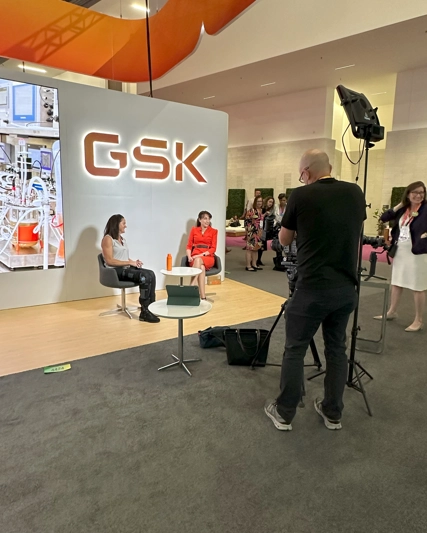GSK announces first participant vaccinated in phase 3 clinical trials of its 5-in-1, meningitis ABCWY vaccine candidate
For media and investors only
Issued: London, UK
- The Phase 3 study is evaluating the safety, tolerability and immunogenicity of GSK’s MenABCWY vaccine candidate compared to Bexsero and Menveo in adolescents and young adults
- Study investigators to enroll 3,650 participants aged 10-25 years in the U.S., Canada, Europe, Turkey and Australia
GlaxoSmithKline plc (LSE/NYSE: GSK) today announced that patient dosing has begun in a phase III clinical programme investigating its 5-in-1 meningitis (MenABCWY) vaccine candidate compared to licensed meningococcal vaccines, Bexsero and Menveo.
Emmanuel Hanon, Senior Vice President and Head of Vaccines R&D for GSK, said: “Entering the final stage of clinical trials with our 5-in-1, MenABCWY vaccine candidate is a major step toward GSK’s goal of reducing meningococcal disease around the world. This vaccine candidate builds on the heritage of Bexsero and Menveo and we would like to thank all the scientific researchers, medical partners, advocates and families around the world who also hope for a successful outcome.”
The initial Phase 3 studies[1] (NCT04502693) will be conducted in individuals aged 10-25 years in the United States, Canada, Europe, Turkey and Australia and the study investigators will enroll 3,650 participants. The trial will evaluate safety, tolerability and immunogenicity of GSK’s 5-in-1, MenABCWY vaccine candidate compared to licensed meningococcal vaccines, Bexsero and Menveo.
Helping protect adolescents and young adults from Invasive Meningococcal Disease (IMD) could require fewer injections if the Phase 3 trial of GSK’s 5-in-1, MenABCWY vaccine candidate succeeds. Five meningitis serogroups -- A, C, W, Y and B -- account for nearly all cases of IMD and there is no 5-in-1 combination vaccine currently available[2].
“Current FDA-approved meningitis vaccines help protect young persons who complete a four-injection regimen during adolescence but unfortunately, only a small percentage receive all four,” said Dr. Charles P. Andrews, MD, CPI – one of the study’s investigators and Director of Clinical Research at the Diagnostic Research Group in San Antonio, Texas. “The investigational vaccine has the potential to reduce the number of injections and thereby improve completion rates.”
The first vaccination of the Phase 3 trial’s first participant is a pivotal milestone in GSK’s leadership in meningitis vaccine research and development. Since their first approvals in 2010 and 2013 respectively, GSK has distributed more than 58 million doses of Menveo (meningococcal groups A,C, Y, and W-135 vaccine) and more than 52 million doses of Bexsero (meningococcal group B vaccine).
The United States has a MenACWY immunisation recommendation for individuals 11-to-12 years old with a booster at age 16, but a 2018 study showed that only 50.8% of older adolescents received the booster dose[3]. The MenB vaccine is administered in adolescents aged 16-23 (preferred age 16-18) based on ‘shared clinical decision-making’ between a healthcare provider and a parent and the MenB coverage rate of at least one MenB dose among 17-year-olds was only 17.2%[4]. From 2011 through March 2019, MenB was responsible for 100 percent of U.S. college meningococcal disease outbreaks[5] involving 13 campuses, 50 cases and two deaths among an at-risk population of approximately 253,000 students.
Barbara Howe, Vice President and Director, Vaccines Medical and Clinical U.S, said: We’re excited to reach this important milestone in the development of a 5-in-1, MenABCWY vaccine. It offers the potential to help protect against all 5 vaccine-preventable serogroups with one combined product. This could reduce complexity and potential confusion of needing two different types of vaccines with the added benefit of fewer injections for each patient.”
About Invasive Meningococcal Disease
Invasive Meningococcal Disease (IMD) is uncommon,[6] with country-specific reported cases ranging from 0.1 to 2.4 cases per 100,000 population in 2017[7]. However, this potentially serious and unpredictable disease can kill in as few as 24 hours[8] and is the leading cause of life-threatening bacterial meningitis in most of the industrialised world[9].About one in 10 of those who contract the disease will die, even with appropriate treatment[10]. Additionally, around 20 percent of those who survive the disease may suffer a major physical or neurological disability (limb loss, hearing loss or seizures)[11].
Adolescents and young adults have higher rates of meningitis due to close contact with each other, sharing drinks or eating utensils, kissing or coughing.[12],[13] While meningococcal disease is uncommon, studies have shown that between 2014-2017, the relative risk of contracting MenB was 3.5 to 5 times higher in college students aged 18-24 years compared with peers not attending college.**†
*(95% confidence interval = 14.9%–19.9%).
**0.17 cases in college students vs. 0.05 cases in peers not attending college per 100,000 population in 2014-2016[3]
†0.22 cases in college students vs. 0.04 cases in peers not attending college per 100,000 population in 2015-2017[14]
About Bexsero
Bexsero is licensed in more than 40 countries. These countries include the member states of the EU, Argentina, Australia, Chile, Israel, New Zealand, Turkey and Uruguay, where Bexsero is approved for individuals two months of age and older, and in Canada for those aged 2 months to 25 years of age. In the U.S., Bexsero is approved for use in individuals from 10 years through 25 years of age. In Brazil, Bexsero is approved for use in individuals from two months to 50 years of age.
Important safety information
In infants and children (less than 2 years of age) the most common local and systemic adverse reactions observed in with Bexsero in clinical trials were tenderness and erythema at the injection site, fever and irritability. In adolescents and adults, the most common local and systemic adverse reactions observed were pain at the injection site, malaise and headache. Consult the full Prescribing Information/Summary of Product Characteristics for all labelled safety information for Bexsero. Up-to-date information about GSK prescription medicines may be found at http://health.gsk.com.
About Menveo
Menveo has been approved in 62 countries and is a vaccine indicated for active immunization to prevent invasive meningococcal disease caused by Neisseria Meningitides serogroups A, C, Y and W-135. In the U.S., Menveo is approved for use in individuals from 2 months through 55 years. Menveo does not prevent N. meningitidis serogroup B infections.
Important safety information for Menveo
Severe allergic reaction after a previous dose of Menveo, any component of Menveo, or any other CRM197, diphtheria toxoid, or meningococcal-containing vaccine is a contraindication to administration. The most commonly reported side effects by adolescents and adults who received Menveo include pain at the injection site, headache, myalgia, malaise, and nausea. Consult the full Prescribing Information/Summary of Product Characteristics for all labelled safety information for Menveo. Up-to-date information about GSK prescription medicines may be found at http://health.gsk.com.
About GSK
GSK is a science-led global healthcare company with a special purpose: to help people do more, feel better, live longer. For further information please visit www.gsk.com/about-us.
Cautionary statement regarding forward-looking statements
GSK cautions investors that any forward-looking statements or projections made by GSK, including those made in this announcement, are subject to risks and uncertainties that may cause actual results to differ materially from those projected. Such factors include, but are not limited to, those described under Item 3.D "Risk Factors" in the company's Annual Report on Form 20-F for 2019 and as set out in GSK’s Principal risks and uncertainties” section of the Q2 Results and any impacts of the COVID-19 pandemic.
References
[1] https://clinicaltrials.gov/ct2/show/NCT04502693?term=205416&draw=2&rank=1 identifier NCT04502693
[2] World Health Organization (WHO), 2018. Meningococcal meningitis Fact sheet no 141. Available at: https://www.who.int/news-room/fact-sheets/detail/meningococcal-meningitis [Accessed March 2020]
[3]Walker TY, Elam-Evans LD, Yankey D, et al. National, Regional, State, and Selected Local Area Vaccination Coverage Among Adolescents Aged 13–17 Years — United States, 2018. MMWR Morb Mortal Wkly Rep 2019;68:718–723. DOI: http://dx.doi.org/10.15585/mmwr.mm6833a2external icon.
[4] Walker TY, Elam-Evans LD, Yankey D, et al. National, Regional, State, and Selected Local Area Vaccination Coverage Among Adolescents Aged 13–17 Years — United States, 2018. MMWR Morb Mortal Wkly Rep 2019;68:718–723. DOI: http://dx.doi.org/10.15585/mmwr.mm6833a2external icon.
[5] Gary S Marshall, Amanda F Dempsey, Amit Srivastava, Raul E Isturiz, US College Students Are at Increased Risk for Serogroup B Meningococcal Disease, Journal of the Pediatric Infectious Diseases Society,piz024, https://doi.org/10.1093/jpids/piz024
[6] Pelton SI. Meningococcal disease awareness; Clincial and epidemiological factors affecting prevention and management in adolescents. J Adolesc Health. 2010;46:S9-S15
[7] European Centre for Disease prevention and Control (ECDC). Surveillance report: Invasive meningococcal disease – Annual Epidemiological Report for 2017. Available at: https://ecdc.europa.eu/en/publications-data/invasive-meningococcal-disease-annual-epidemiological-report-2017 [Accessed march 2020]
[8] Thompson MJ et al. Clinical recognition of meningococcal disease in children and adolescents. Lancet. 2006;367:397-403
[9] Rappuoli R et al. Meningococcal B vaccine (4CMenB): the journey from research to real world experience. Expert Rev Vaccines. 2018;17(12):1111-1121
[10] World Health Organization (WHO), 2018. Meningococcal meningitis Fact sheet no 141. Available at: https://www.who.int/news-room/fact-sheets/detail/meningococcal-meningitis [Accessed March 2020]
[11] World Health Organization (WHO), 2018. Meningococcal meningitis Fact sheet no 141. Available at: https://www.who.int/news-room/fact-sheets/detail/meningococcal-meningitis [Accessed March 2020]
[12] Walker TY, Elam-Evans LD, Yankey D, et al. National, Regional, State, and Selected Local Area Vaccination Coverage Among Adolescents Aged 13–17 Years — United States, 2018. MMWR Morb Mortal Wkly Rep 2019;68:718–723. DOI: http://dx.doi.org/10.15585/mmwr.mm6833a2external icon
[13] Gary S Marshall, Amanda F Dempsey, Amit Srivastava, Raul E Isturiz, US College Students Are at Increased Risk for Serogroup B Meningococcal Disease, Journal of the Pediatric Infectious Diseases Society,piz024, https://doi.org/10.1093/jpids/piz024

